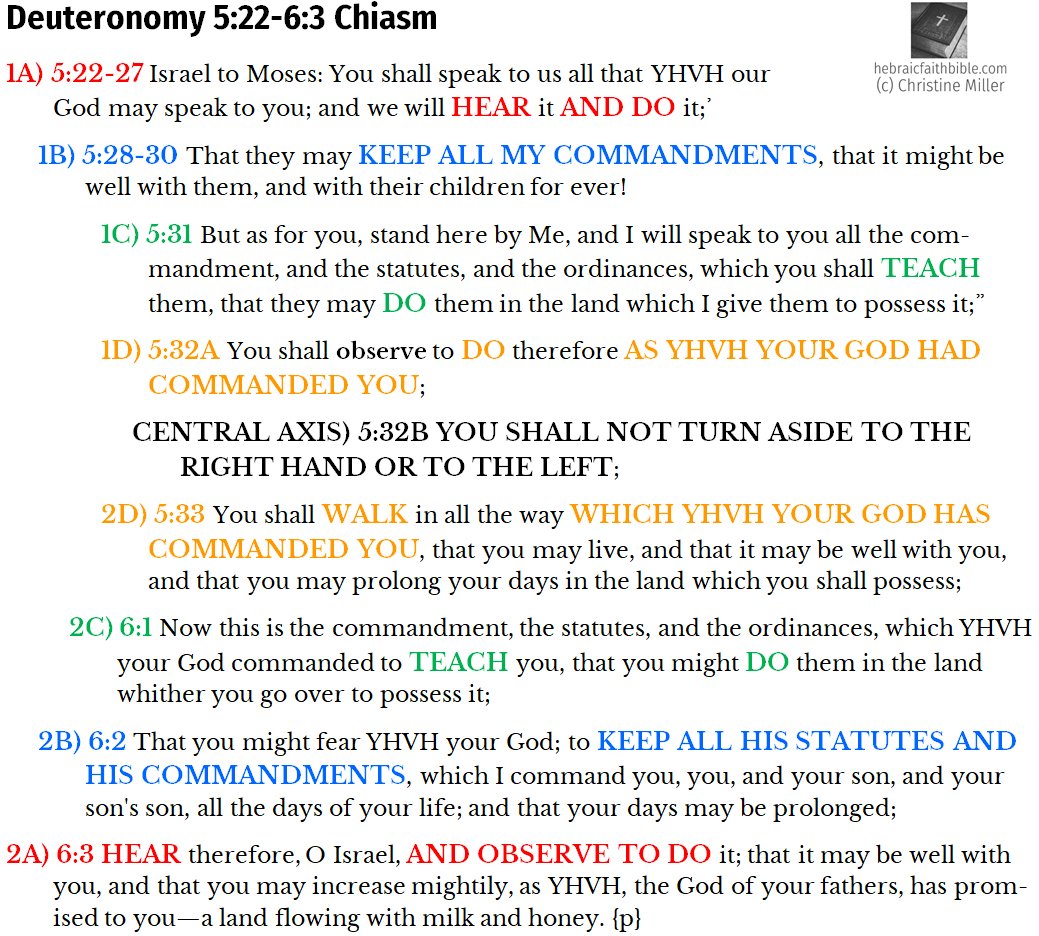Read Deuteronomy 6 here (text coming …) or at Bible Gateway.
The Hebrew Paragraphs:
5:22-6:3 {p} YHVH’s voice spoke these commandments, so hear, pay heed, and observe them
6:4-9 {s} Hear YHVH’s commandments
6:10-15 {s} Pay careful heed to and keep YHVH’s commandments
6:16-19 {s} Do YHVH’s commandments
6:20-25 {s} Teach YHVH’s commandments to your children
Just looking at the Hebrew paragraphs, we can see that four verbs are Repeated: 1) Hear, 2) Pay careful heed and keep, 3) do, and 4) teach. Moreover in the Chiastic Structure for Deu 5:22-6:3, all four show up repeatedly as well:
Let’s look at the Hebrew verbs one by one.
Hear is Strong’s H8085 שמע shama, a primitive verb meaning “to hear, to listen and attend, to hear and answer, to obey or give heed.” The pictographs are shin + mem + ayin.
shin ש = two front teeth, thus sharp, press, eat, two, again
mem מ, ם = the water, thus chaos, mighty, blood
ayin ע = the eye, thus watch, know, shade
According to the Hebrew Root Word Teaching Tool, the parable being told is of breath which passes through the front teeth (shin) expelling water (mem) as vapor from the body. When we listen, we breathe intently as we focus on what is being said so that we can comprehend it (ayin). In the Hebraic worldview, shama, to hear or listen, is an active and not a passive verb. If we hear what is said but do not act on or respond to what is said, then we have not heard at all. Thus shama includes an implication of obedience as Deu 6:4 indicates:
Hear, O Israel: YHVH our God, YHVH alone is God. Deu 6:4
Pay careful heed is Strong’s H8104 שמר shamar, a primitive verb meaning “to keep, to watch, to guard as a husbandman or shepherd.” The modern verb is shin + mem + resh, but the Ancient Hebrew Lexicon tells us that the shin + mem pair in this root was originally a sin + nun, the similar sounds becoming transposed over time.
sin ס = the thorn, thus grab, hate, protect
nun נ, ן = the seed, thus continue, heir, son
resh ר = the head of man, thus head, first, top, beginning, man
Shepherds would surround their flocks at night with thorn branches to protect them from predators when they were pasturing them away from the fold. They kept or guarded their flocks so that their children would be provided for. Thus, to closely guard (sin) for the next generation (nun) that which is of first importance (resh). In the Chiastic Structure, this verb is translated into English as keep, which, according to the parable, means to closely guard the commandments so that they are not forgotten.
Then beware lest you forget YHVH, who brought you forth out of the land of Egypt, out of the house of bondage. Deu 6:12
Do is Strong’s H6213 עשה asah, a primitive verb meaning, “to do.” The modern verb is ayin + shin + hey, but the Ancient Hebrew Lexicon tells us that the shin was transposed from an original sin over time because of their similar sounds.
ayin ע = the eye, thus watch, know, shade
sin ס = the thorn, thus grab, hate, protect
hey ה = man with upraised arms, thus exclaim, reveal, wonder, worship, breath
The story being told is of man’s first work in watching (ayin) for thorns and thistles (sin) which would seek to take over his crops:
“Cursed is the ground for your sake; in toil you shall eat of it all the days of your life. Both thorns and thistles it shall bring forth for you, and you shall eat the herb of the field. In the sweat of your face you shall eat bread till you return to the ground …” Gen 3:17-19
The addition of the hey adds the element that a man is to do with all his might, whatever his hand finds (hey, i.e., pointing out what has been discovered) to do:
Whatever your hand finds to do, do it with your might; for there is no work or device or knowledge or wisdom in the grave where you are going. Ecc 9:10
And you shall do that which is right and good in the sight of YHVH; that it may be well with you, and that you may go in and possess the good land which YHVH swore to your fathers … Deu 6:18
Teach is translated “to teach” or “to learn” depending on the context. It is Strong’s H3925, למד lamad, a primitive verb whose letters are lamed + mem + dalet.
lamed ל = the shepherd’s staff, thus teach, yoke, to, bind
mem מ, ם = the water, thus chaos, mighty, blood
dalet ד = the door, thus enter, move, hang
The parable is of the shepherd who uses his staff (lamed) to guide and direct the sheep to water (mem) and back again through the door (dalet) of the sheepfold. “To learn” is to receive the shepherd’s or teacher’s direction along the path of life.
Now this is the commandment, the statutes, and the ordinances, which YHVH your God commanded to teach you, that you might do them in the land you are going over to possess. Deu 6:1
The bulk of Moses’ speech from Deu 5-26 explains what it means to keep the Ten Commandments. In Deu chapter 6, Moses begins explaining how to keep The Commandment, the First Commandment.
If there are questions, these are good resources:
Deu 6:4-9, The First Commandment is the greatest commandment – Christine Miller
Deu 6:4-11:25, First Commandment Summary – Christine Miller


















Leave a Reply